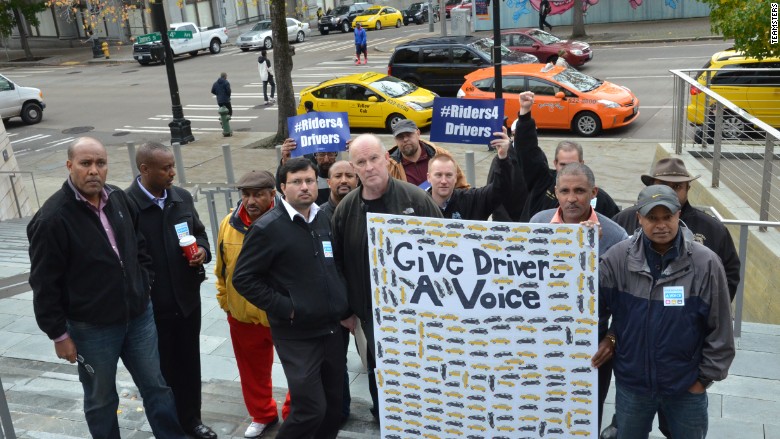
Seattle lawmakers gave Uber drivers the green light to unionize on Monday.
The city's new ordinance applies to all taxi drivers in Seattle, including for-hire cabs, taxi companies and app-based on-demand firms such as Uber and Lyft.
Companies like Uber typically classify their drivers as independent contractors. That allows the companies to avoid paying their drivers benefits like overtime and health insurance.
As a result, Councilmember Mike O'Brien noted that many of those workers earn below minimum wage, and they have a difficult time making their voices heard when lodging complaints with their companies.
O'Brien says Seattle's new law will make their businesses safer, and more reliable and cost-effective.
"I would like to have a regulatory environment that allows companies to adapt and meet their needs, but not at the expense of their workers," O'Brien told CNNMoney.
The bill was supported by the local Teamsters union, which is working with the App-Based Drivers Association to represent hundreds of Uber and other drivers in the Seattle area.
"As a cab driver, making a living has become really hard," a Seattle-based taxi driver wrote on a Teamsters blog supporting the bill. "All we are asking for is a level playing field and that can't happen until drivers have a right to speak up."
A spokesman from Uber did not directly comment on the legislation but said the company supports its drivers.
"Uber is creating new opportunities for many people to earn a better living on their own time and their own terms," the spokesman said. "Drivers say that with flexible and independent work with Uber, 50% of them drive fewer than 10 hours a week, 70% have full-time or part-time work outside of Uber and 65% choose to vary the hours they drive 25% week-to-week."
Uber has been plagued by labor issues recently, facing driver protests, bans by local governments, a class-action lawsuit brought by drivers and a ruling by the California Labor Commissioner that said a former driver should have been classified as an employee.
It's not clear what effect Seattle's new law will have, and Uber will likely challenge the law in court, arguing that collective bargaining among independent contractors could be considered price-fixing under federal antitrust law.

